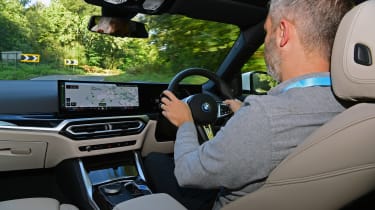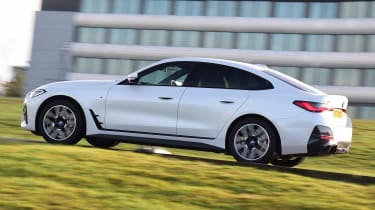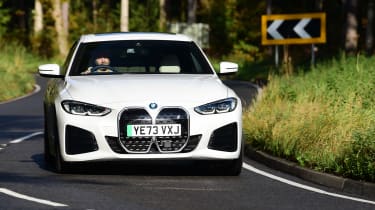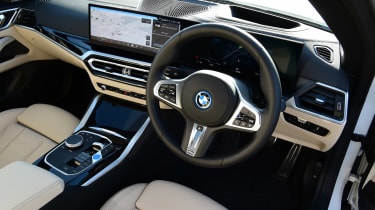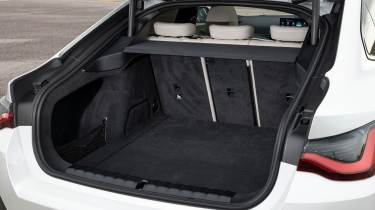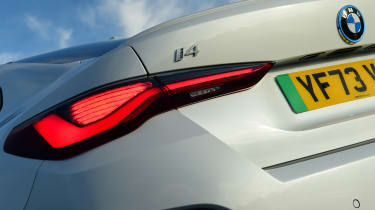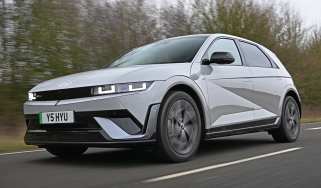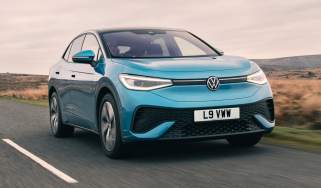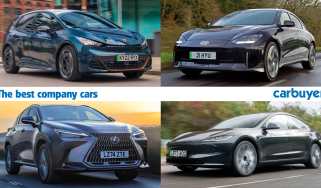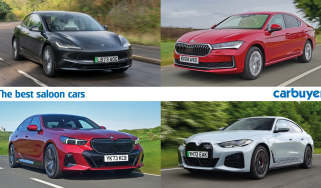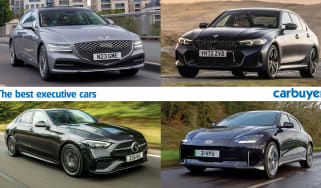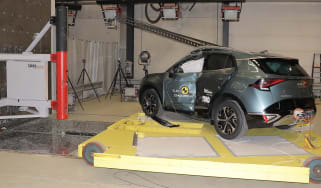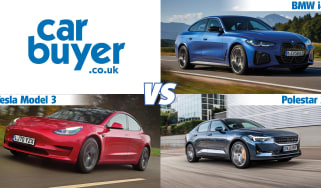BMW i4 review – electric cars can be fun
“BMW’s first all-electric compact executive model almost does it all and proves electric cars can indeed be fun to drive”
Pros
- Classy interior
- Great handling
- Impressive range
Cons
- Expensive
- No front boot
- Confusing infotainment
Verdict – is the BMW i4 a good car?
The BMW i4 is, simply put, one of the best electric cars to drive. It might weigh considerably more than the petrol-powered 4 Series, but BMW has worked its engineering magic to ensure the i4 feels just as sporty from behind the wheel. The i4 also has a strong electric range and a great interior, making it a car with very few compromises – if you don’t mind its rather controversial styling, that is.
BMW i4 models, specs and alternatives
The BMW i4 is a vital new model for the brand because it represents the first all-electric model intended to win over buyers of its core BMW 3 Series and BMW 4 Series models. Not only that but it also locks horns with the Tesla Model 3, Polestar 2 and the Hyundai Ioniq 6, while also giving BMW a headstart on Mercedes and Audi in the compact executive electric car class.
Similar in proportion to the BMW 4 Series Gran Coupe, the i4 gets four doors and a hatchback, but still looks low and sporty. There’s not much to give away that it’s an electric version aside from the blanked-off grille, BMW roundels encircled in blue and eDrive badging on the tailgate. In M Sport and M50 guise, it's fairly muscular, with jutting bumpers, deep side skirts and a rear bumper diffuser in place of tailpipes.
 The 10 best electric cars in 2025
The 10 best electric cars in 2025
We tested the BMW i4 against its main company-car rivals, the Tesla Model 3, BYD Seal, Polestar 2, Volkswagen ID.7 and Hyundai Ioniq 6. It came in second place behind the Model 3 merely because many of that car’s on-paper figures are superior when it comes to performance, efficiency or charging. The i4 wasn’t far behind, though, and still arguably has more of an ‘X factor’, plus a better driving experience as well as comfort levels behind only the ID.7.
There are three electric motor and battery combinations to choose from. The entry-level i4 eDrive35 gets a 282bhp electric motor, rear-wheel-drive and a 67kWh (usable) battery for a range of up to 306 miles on a single charge. Next, the i4 eDrive40 gets a more powerful 335bhp motor, along with a larger 81kWh battery for a 368-mile range and a 0-62mph time of just 5.6 seconds.
Finally, the high-performance M50 is the first electric car from BMW’s M division. It gets another electric motor for the front wheels, bringing four-wheel drive and a combined total of 537bhp. This reduces range to 318 miles but also cuts the 0-62mph time to 3.9 seconds.
Aside from the M50, which can almost be considered a separate model in and of itself, the eDrive35 and eDrive40 can be specified in either Sport or M Sport trim. As you’d expect from a premium German car starting from over £50,000, standard equipment is strong even for the base-level Sport. All cars get BMW’s iDrive infotainment setup – we’ll explore this later – as well as LED headlights, Sensatec faux-leather upholstery, heated front seats, climate control and a reversing camera. M Sport adds a racier bodykit, unique upholstery, electrically adjusting and memory seats and privacy glass.
Safety is commendable, thanks to a wide range of standard and optional features that make the i4 safer and easier to drive. However, the BMW i4 just missed out on top marks in Euro NCAP testing, scoring a total of four out of a possible five stars.
One thing worth considering is price, as the BMW i4 is quite a bit more expensive than rivals. Even the most affordable model costs over £50,000, while the Polestar 2 starts at less than £45,000. The ever-popular Tesla Model 3 is cheaper still, costing from £40,000. It’s up to you to decide whether the i4’s promise of a sporty drive and the BMW badge demands such a premium, though.
Range, charging & running costs
While electric cars now have more range than ever, range anxiety is still something that plagues the mind of many EV buyers. Thankfully, even the entry-level BMW i4 eDrive35 offers enough range for most buyers as it’s able to travel up to 306 miles on a single charge, thanks to a 67kWh battery pack.
Of course, this figure is highly dependent on spec – M Sport cars offer slightly less range (298 miles) due to bigger wheels and a more aggressive bodykit – as well as how you drive, as frequent hard acceleration and high motorway speeds will quickly take their toll on your level of charge.
If you plan on doing longer journeys frequently, we recommend stepping up to the eDrive40 with its larger 81kWh battery. Clearly designed to take on the Tesla Model 3 Long Range, this model can manage an impressive range of up to 368 miles – although this is still considerably less than the 436 miles offered by the cheaper Tesla.
With an extra motor and a lot more power, the i4 M50 sees the official range drop to 318 miles, which is still an impressive figure. During our test drive of this model, we began with 90% charge, giving an indicated range of 232 miles. After 91 miles of mixed driving, the battery had already dropped to 44% with 112 miles remaining.
| Model | Battery size | Range |
| BMW i4 eDrive35 | 67kWh | 306 miles |
| BMW i4 eDrive40 | 81kWh | 368 miles |
| BMW i4 M50 | 81kWh | 318 miles |
Find a powerful enough public rapid charger, and the i4’s battery can be replenished from 10-80% in around half an hour thanks to most versions having a DC charging speed of 205kW. That’s a little slower in the eDrive35 at 180kW, but the smaller battery means the same top-up will be delivered in roughly the same time. A home wallbox takes around 13 hours to charge the larger battery from empty to 100%. A home charging cable, public charging cable and BMW Charging Card for use on the public network are included with the car.
Every i4 will be exempt from VED (road tax) until April 2025, which will be a significant cost saving, avoiding the surcharge usually levied against cars costing more than £40,000. Business drivers will form a big part of the i4's audience – as they have for the Tesla Model 3 – thanks to its minimal Benefit-in-Kind (BiK) tax liability. Insurance is expensive, however, particularly for the M50 with its searing performance. On a lighter note, i4 owners will also be able to drive into cities with low emissions zones without paying.
Electric motor, drive & performance
A lot is expected of the i4 in this department. Not only is it the manufacturer's most focused electric car to date but it's essentially a battery-powered version of its legendary 3 and 4 Series models. As a result, BMW clearly knew the car had to be good to drive.
Settle into the i4’s driver’s seat and things are off to a good start. Even though the i4’s battery is located under the floor, BMW has managed to keep the driving position low to the ground which is in keeping with the brand’s sporty character. In contrast, the driving position in rivals such as the Hyundai Ioniq 6 feels a little high.
Despite the car’s weight (over two tonnes), the weight distribution is 50:50 and the i4's battery has given it a very low centre of gravity. The axles have been widened compared with those of the 3 Series, too. The result is that the i4 instantly feels lighter than anticipated, and its biggest advantage over rivals is in the corners, where it feels well-balanced and there’s very little body lean.
The steering is a key ingredient, as it's both precise and natural enough to allow the driver to accurately place the car and build confidence in the i4. It isn't especially communicative, however, so it can be tricky to judge exactly how much grip the front tyres have. All in all, though, we found the i4 to have a driving experience in another league compared to rivals when we drove them back to back in our electric company car megatest.
The M Adaptive Suspension option is a great upgrade, as it allows you to switch from the Comfort setting to Sport, giving the car a wider range of ability – we’d rather the drive modes were controlled via a physical knob, but shortcuts accessed through the iDrive system are at least easy to use. Near-silent electric motors and an impressive lack of wind and tyre noise make the i4 a very relaxing car, even at motorway speeds. Impressively, even when replacing the standard 17-inch alloys with optional 19-inch ones, the i4’s ride quality feels better than that of a Hyundai Ioniq 6.
You might feel as though you’re copping out by going for the base eDrive35 model as it’s got less power (282bhp) compared to the rest of the lineup and some of its rivals, but with power outputs in some cars getting to ridiculous levels, you can rest assured that it’s still plenty. The i4’s throttle response is great, so you’re able to fully utilise the power that’s on offer and we still think this model is better to drive than all of its rivals. Better yet, it’s actually the quietest to ride along in at a cruise and feels supremely stable on the motorway.
Sitting at the pinnacle of the i4 lineup, the M50 produces 537bhp, thanks to front and rear electric motors. It's enough thrust to get the i4 from 0-62mph in 3.9 seconds, and under full power the M50 hunkers down on its wheels and shoots forwards with startling pace. With no mechanical limited-slip differential and a 2.3-tonne bulk, the car can start to lose its composure if you accelerate too aggressively out of a slow corner, so it responds better to a more relaxed approach.
While the M50 will give a BMW M4 a run for its money, at least in a straight line, most buyers will be more than satisfied with the entry-level eDrive35 model. With a single motor and rear-wheel-drive, it has 282bhp and gets from 0-62mph in a not-insignificant six seconds. A more-powerful eDrive40 model is also offered with a bigger battery and a more powerful 335bhp motor, cutting the 0-62mph sprint down to just 5.6 seconds. Both feel more than rapid enough to suit most tastes, and even make the M50 seem a bit unnecessary.
| Model | Power | 0-62mph | Top speed |
| BMW i4 eDrive35 | 282bhp | 6s | 118mph |
| BMW i4 eDrive40 | 335bhp | 5.6s | 118mph |
| BMW i4 M50 | 537bhp | 3.9s | 140mph |
Interior & comfort
The i4’s interior layout won't look too unfamiliar to BMW 3 Series and 4 Series owners, and it has the same excellent build quality, with brushed metal finishes, leather and even carbon fibre trim in one of our test cars – having stepped from the i4 into many of its rivals back to back, we think its interior is in another league in terms of quality. You get the same infotainment setup as the 3 and 4 Series, which features a 12.3-inch instrument display and 14.9-inch media screen in a single curved panel, floating above the dash.
These are powered by the brand's latest iDrive 8.5 software, with tech including 5G connectivity, augmented reality sat-nav and an Intelligent Personal Assistant. The display itself offers sharp graphics and rich colours, which make it more attractive than the infotainment offered in the Hyundai Ioniq 6. We found that there were minimal reflections on the display thanks to the slight curvature of the screens.
The sheer processing power means it responds just as quickly as the latest smartphones, but we found the array of sub-menus tricky to navigate while driving. A similar thing can be said for the climate controls, which occupy the bottom of the screen, rather than being operated via physical dials.
It’s not all bad news, though. We’re pleased that the i4 still has BMW’s rotary iDrive controller, unlike some of its newer models. This physical dial sits on the centre console along with a selection of shortcut buttons, allowing you to control the infotainment system without using the touchscreen. It makes navigating the somewhat cluttered menus a bit easier while on the move, so we expect many drivers will prefer it over Tesla and Polestar’s touchscreen-only interfaces.
The BMW i4 comes with supportive, yet comfortable sports seats which come as standard with a mix of Alcantara and artificial leather. This can be upgraded to real leather as an option. The driver’s seat has plenty of adjustment, so drivers of all sizes should be able to find a comfy driving position.
Standard on all BMW i4s are LED headlights, 17-inch alloy wheels, Shadowline gloss black exterior trim, park assist, a rear camera, climate control, heated front seats, a 14.9-inch touchscreen, 12.3-inch driver’s display, powered tailgate, ambient interior lighting and an efficiency-boosting heat pump.
In typical BMW fashion, there are several pricey option packs that you can add. We expect most buyers will hand over the extra £1,500 to upgrade from Sport to M Sport trim with its sportier styling. M Sport models can also be had with M Adaptive Suspension for an extra £450 – a well-worthwhile upgrade that allows you to switch between comfort and sport modes.
Practicality & boot space
The i4 is around the same size as the BMW 4 Series Gran Coupe but its all-electric nature does mean there are some differences inside. Front passengers can get nice and low, giving the car a sporty feel, but the floor-mounted battery means there isn't as much footwell space for rear passengers. Knee room still isn't too bad for taller passengers but they may find it a bit uncomfortable for long trips.
Boot capacity impresses, with 470 litres of volume that's just 10 litres down on the 4 Series Gran Coupe. The Polestar 2 has a smaller 405-litre boot but unlike the i4 it also has a 35-litre 'frunk' under the bonnet. Both the i4 and the Polestar 2 have a hatchback opening, making it easier to load bulky items than the saloon-style boot lid of the Tesla Model 3 or Hyundai Ioniq 6.
The i4 comes with larger door bins than those of the Ioniq 6, so large drinks bottles can be held securely. Phone storage and charging sockets can be found ahead of the gear selector, and the armrest cubby hole is deep, so there are plenty of storage solutions around the cabin.
Reliability & safety
While BMW might not be such an obvious player in the electric car market, it has been building EVs and hybrid models for quite a number of years, including the BMW i3 which launched in 2013. The fact its eDrive electric technology is now its fifth generation should prove reassuring for buyers and we expect the car to prove extremely robust.
However, the BMW brand doesn’t excel in our Driver Power owner satisfaction surveys, with the German marque coming in a middling 14th place out of 32 manufacturers in 2024. Though the stats aren’t unique to just the electric models, a slightly lower-than-average 21% of BMW owners reported an issue with their car in the first year of ownership. Tesla owners appear to be more satisfied with their cars, but BMW still finished ahead of its home-turf rivals, Mercedes and Audi – that’s something to be proud of, given how customers tend to expect more from these premium brands than mainstream manufacturers.
The i4 is available with around 40 driver assistance features to make it safer and easier to drive and park. It's fitted with a reversing camera and Parking Assistant as standard, while the optional Driving Assistant Professional adds adaptive cruise control that can stop and start the car in heavy traffic. It can also help steer the car in its lane, reduce the likelihood of side and rear collisions and help prevent accidental speeding. However, all of this technology and equipment wasn’t enough to earn the i4 top marks in tough Euro NCAP safety tests. The BMW was awarded four out of a possible five stars after missing out on some critical points in the crash avoidance categories.
Which Is Best?
Cheapest
- Name210kW eDrive35 Sport 70kWh 5dr Auto
- Gearbox typeAuto
- RRP£51,950
Most Economical
- Name250kW eDrive40 Sport 83.9kWh 5dr Auto
- Gearbox typeAuto
- RRP£60,045
Fastest
- Name440kW M60 83.9kWh 5dr Auto
- Gearbox typeAuto
- RRP£71,580
